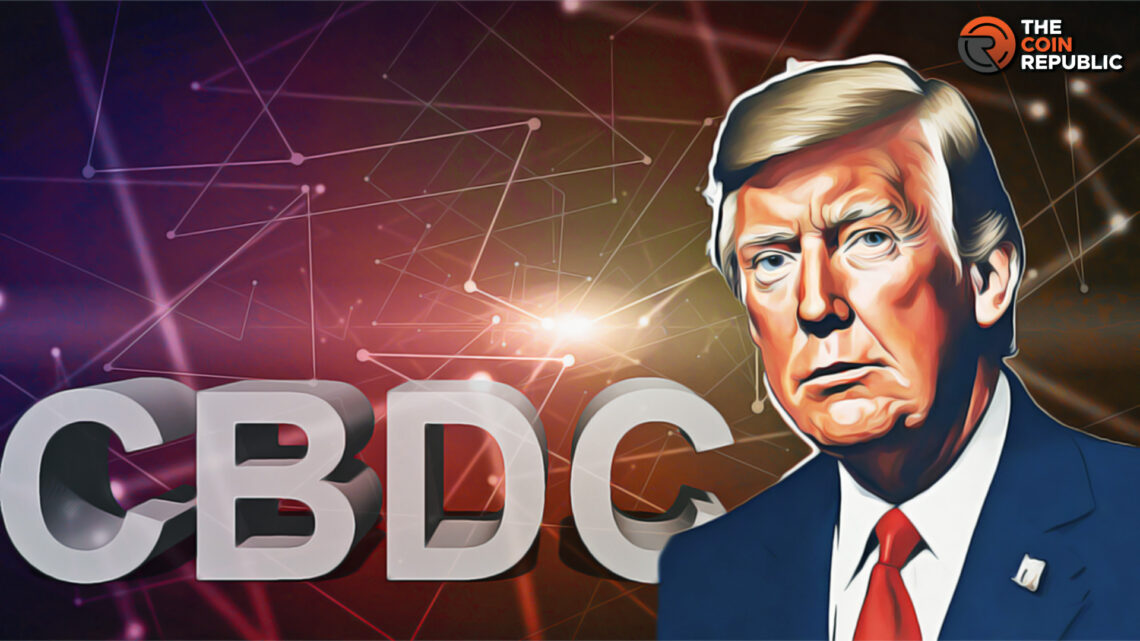- 1 Former President Donald Trump vows to ban the creation of a central bank digital currency (CBDC) if elected in 2024.
- 2 Claims a government-backed digital currency would threaten personal freedoms and give the federal government “absolute control” over money.
- 3 Trump previously owned over $2.5 million in ether cryptocurrency.
Donald Trump, aiming for the 2024 presidential run, vows to block the creation of a central bank digital currency (CBDC). At a recent New Hampshire campaign event, Trump emphasized that a government-controlled digital currency poses a serious threat to freedom, pledging to prevent its introduction in America. He contends that such a currency would grant authorities “absolute control” over citizens’ money, allowing secretive withdrawals without consent.
What are CBDCs?
Central bank digital currencies (CBDCs) are digital cash issued and regulated by a country’s central bank, representing a digital version of traditional banknotes and coins. They may utilize blockchain technology for payment infrastructure.
While concrete plans are yet to be defined, the idea of a potential “digital dollar” has ignited discussions in U.S. politics, particularly among Republican figures such as Trump and Florida Governor Ron DeSantis.
Opponents suggest that CBDCs may amplify government surveillance, limit personal freedoms, and compete with private cryptocurrencies. On the other hand, advocates argue for their potential to enhance financial inclusion and modernize outdated payment systems.
Trump’s Past Crypto Ownership
Ironically, Trump himself previously invested in cryptocurrency, despite now positioning himself as a crypto skeptic.
According to an August 2023 financial disclosure, the former president owned more than $2.5 million worth of ether – the native token of the Ethereum blockchain network – at the end of 2021.
It suggests that Trump only recently turned against digital assets like Bitcoin and ether, having previously seen them as worth investing in.
Unlikely in the Near Term
While Trump and fellow Republicans have raised concerns about a digital dollar, experts say the launch of an official US CBDC remains unlikely in the short term.
In a November 2022 report, Bank of America wrote that while central banks globally are actively researching CBDCs, the Federal Reserve is taking a cautious approach and moving slowly.
Recent surveys indicate nearly 70% of Americans have not heard much about CBDCs. With limited public awareness and understanding, the Fed appears content to carefully weigh the complex risks and benefits rather than rushing to introduce a digital currency.
Rising as Campaign Issue
Nonetheless, opposing CBDCs and framing them as a privacy threat has become an increasingly common Republican tactic to rally voters.
Beyond Trump’s national-level promises, state politicians like Governor DeSantis are also pushing anti-CBDC legislation at local levels. Florida recently passed a bill banning CBDCs in the state.
Concerns Over Civil Liberties
Samuel Armes of the Florida Blockchain Business Association helped draft Florida’s anti-digital currency bill. He argues that CBDCs urgently need restriction before the concept advances too far.
“If CBDCs are the encroachment on our civil liberties that most people believe they are, we don’t have time to wait,” Armes said last year. “At the end of the day, if the Feds want something, they will try to get it. So it’s our job to try and stop it.”
The intersection of technology, privacy, and personal freedom will likely ensure CBDCs remain hotly debated as the 2024 election approaches. Trump and the Republicans seem prepared to leverage anti-CBDC sentiment as a key plank of their campaign strategy.
Conclusion
In summary, Donald Trump has vowed to prohibit the creation of central bank digital currencies if elected president in 2024. He argues a government-controlled digital currency would infringe on civil liberties and give federal authorities excessive control over the financial system.
While experts suggest a US CBDC is still distant, opposition continues mounting on right-wing campaign trails. Anti-CBDC rhetoric seems poised to become a Republican tactic to court libertarian-leaning voters ahead of the next national election.

Nancy J. Allen is a crypto enthusiast, with a major in macroeconomics and minor in business statistics. She believes that cryptocurrencies inspire people to be their own banks, and step aside from traditional monetary exchange systems. She is also intrigued by blockchain technology and its functioning. She frequently researches, and posts content on the top altcoins, their theoretical working principles and technical price predictions.


 Home
Home News
News










